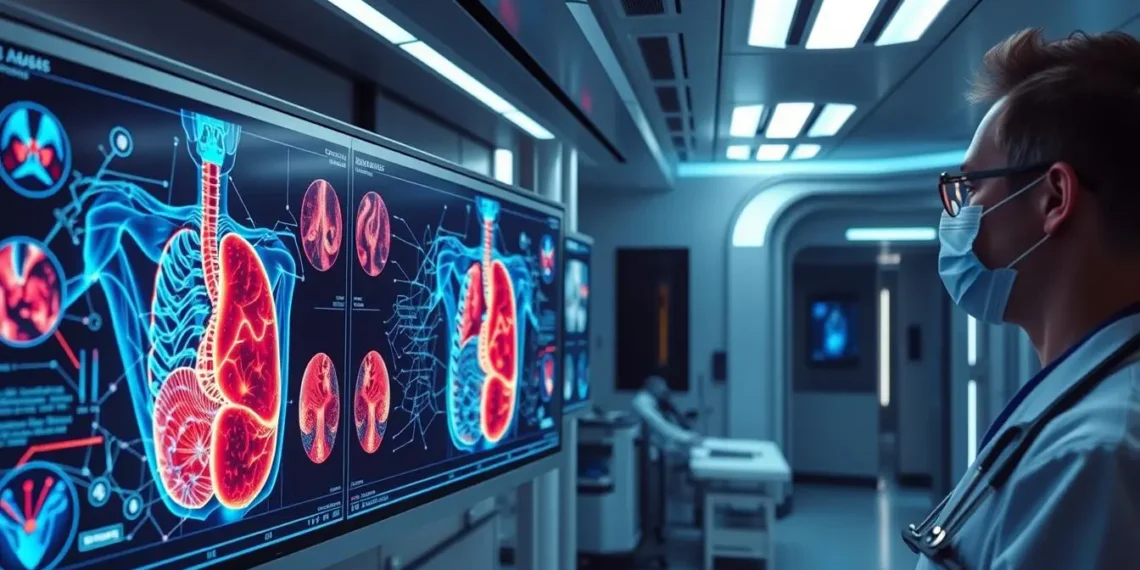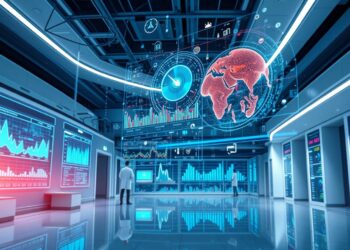Could artificial intelligence truly transform the future of medical diagnosis faster than human doctors can detect a critical health condition?
AI is changing healthcare by making medical analysis more precise and fast. It lets doctors quickly process huge amounts of patient data. This boosts their ability to make accurate diagnoses.
Your medical journey is about to change dramatically. Advanced AI technologies can now analyze complex datasets including molecular biomarkers, genetic information, and patient histories with remarkable accuracy. Machine learning algorithms can identify critical health indicators that might escape traditional diagnostic methods.
The potential of AI-powered diagnostics extends beyond simple data processing. By leveraging unique patient biomarkers and risk factors, these intelligent systems can reduce trial-and-error approaches in treatment identification. This means more personalized, targeted healthcare tailored specifically to your individual needs.
Modern AI technologies process large volumes of data quickly, enabling faster test results and more efficient treatment decision-making. From identifying early disease markers to recommending personalized treatment plans, artificial intelligence is reshaping how healthcare professionals approach patient care.
Table of Contents
Understanding the Revolution of AI in Modern Healthcare
The healthcare world is changing fast thanks to smart tools and data-driven decisions. Artificial Intelligence is changing how doctors care for patients, diagnose, and treat them.
AI is becoming key in today’s medicine. It has the power to greatly improve health care. Surveys show some exciting facts:
- 80% of medical leaders think AI will be crucial in health care soon.
- 25% of health systems are already using AI.
- 59% plan to use AI to better care for patients.
Key Components of AI-Driven Healthcare Systems
AI health systems use advanced tech like machine learning and natural language processing. These tools help doctors analyze and predict health issues like never before.
| AI Technology | Healthcare Application | Impact Percentage |
| Machine Learning | Diagnostic Accuracy | 45% Improvement |
| Natural Language Processing | Medical Documentation | 70% Time Reduction |
| Deep Learning | Medical Imaging Analysis | 30% Enhanced Detection |
Impact on Patient Care and Outcomes
AI is changing how we care for patients. It can predict diseases, tailor treatments, and make admin tasks easier. This leads to lower costs and better health outcomes.
Current Implementation Statistics
AI in health care is growing fast. McKinsey & Company says AI could cut U.S. health care costs by up to $150 billion a year by 2026. By 2025, AI will handle over 85% of health care interactions.
AI-Powered Diagnostics and Decision Support: Core Technologies
Machine learning in healthcare is changing the game. It’s making clinical decision support systems smarter. These systems help doctors understand and act on complex health data.
The key technologies behind AI diagnostics include:
- Machine learning algorithms
- Natural language processing techniques
- Deep learning neural networks
- Advanced pattern recognition models
Clinical decision support systems use these tools to quickly and accurately process health data. AI can look at many sources at once, like:
- Electronic health records
- Medical imaging
- Genomic information
- Patient history databases
| AI Technology | Primary Function | Healthcare Impact |
| Machine Learning | Data Pattern Recognition | 40% Improvement in Diagnostic Accuracy |
| Deep Learning | Complex Image Analysis | Comparable Performance to Human Specialists |
| Neural Networks | Predictive Healthcare Modeling | Early Disease Detection |
With advanced machine learning, clinical support systems can offer personalized medical recommendations. This leads to better diagnosis and care for patients.
Medical Imaging and AI Analysis
AI is changing medical diagnostics with smart imaging analysis. Your healthcare is getting better and faster. AI is making it easier for doctors to understand complex images.
Advanced AI is changing how doctors read medical images. Radiologists use new tools that make them more accurate and quick.
Deep Learning in Radiology
Deep learning algorithms are amazing in medical imaging:
- 94% diagnostic accuracy in complex image analysis
- Faster detection of subtle abnormalities
- Reduced diagnostic errors compared to traditional methods
Computer Vision Applications
Computer vision is changing medical diagnostics. It gives doctors new insights into patient health. AI can spot details that humans might miss.
| Medical Imaging AI Capability | Accuracy Rate | Key Benefit |
| Chest X-ray Pneumonia Detection | 92% | Early Disease Recognition |
| Mammography Screening | 88% | Reduced False Positives |
| Brain Tumor Segmentation | 95% | Precise Tumor Mapping |
Automated Image Recognition Systems
Automated systems are changing medical diagnostics. Machine learning algorithms can quickly and accurately analyze complex images. This helps doctors with their work.
With advanced AI, doctors can get better and more detailed insights. This leads to better care and outcomes for patients.
Predictive Analytics and Disease Prevention
Predictive analytics in healthcare is a new way to fight chronic diseases. It uses AI to spot health risks early. This helps doctors prevent big problems before they start.
This method is powerful because it looks at lots of patient data. About 60% of Americans have at least one chronic disease. Finding these diseases early is key to better health.
- Analyze electronic health records
- Examine wearable device data
- Identify individual risk factors
- Develop personalized prevention strategies
More healthcare groups are using AI to change how they work. The University of California San Diego Health System is a great example. They use predictive analytics to catch sepsis early.
| Healthcare Challenge | Predictive Analytics Solution |
| Hospital Readmissions | 82% reduction potential |
| Chronic Disease Management | Early risk identification |
| Treatment Optimization | Personalized intervention strategies |
Predictive analytics does more than help patients. It also helps healthcare systems save money and improve health for everyone. This is thanks to AI-enabled disease detection.
With advanced machine learning, doctors can make better plans to prevent and manage diseases. This is a big step forward in healthcare.
Clinical Decision Support Systems Integration
Clinical decision support systems (CDSS) are changing healthcare. They give doctors smart tools for making decisions based on data. These systems use artificial intelligence to offer quick, accurate advice during patient care.
Healthcare today faces big challenges. Medical mistakes are a major cause of death in the U.S. About 12 million patients are affected by these errors each year. This shows how important it is to have advanced support systems.
Machine Learning Algorithms in CDSS
Machine learning algorithms are changing CDSS. They work with complex medical data very well. These systems can:
- Analyze patient records fast
- Spot potential diagnostic risks
- Offer personalized treatment plans
- Predict health problems
Natural Language Processing Applications
Natural language processing helps CDSS understand medical notes. It closes gaps in communication between healthcare systems. This tech makes it easy to get important patient info from notes and studies.
Real-time Decision Support Tools
Real-time tools give doctors quick access to guidelines. They use AI to help make fast, accurate decisions at the moment of care.
| CDSS Capability | Performance Metrics |
| Diagnostic Accuracy | Up to 94% detection rates |
| Treatment Optimization | 40% reduction in adverse drug reactions |
| Early Disease Detection | 30% improvement in cancer screening |
As healthcare keeps growing, CDSS are key for better patient care and fewer mistakes.
Enhancing Diagnostic Accuracy Through AI
AI is changing healthcare by making diagnoses more accurate and improving patient care. It helps doctors find diseases quickly and correctly. This means less mistakes and faster help for patients.
AI has made big strides in many areas of medicine:
- Cancer detection accuracy improved by 40%
- Radiology image analysis enhanced by machine learning algorithms
- Early disease identification rates increased significantly
AI goes beyond old ways of diagnosing. Intelligent diagnostic tools can look at lots of medical data. They find patterns and problems that people might miss. For example, AI can:
- Detect early signs of chronic conditions
- Predict potential health risks
- Recommend personalized preventive measures
In 2023, AI reached a 90.2% accuracy rate in medical tests. This is a huge 22.6 percentage point jump from the year before. This shows how much AI can change healthcare.
As AI gets better, doctors can use these tools to make better choices. This leads to better care for patients and less uncertainty in diagnosis.
Implementation Challenges and Security Considerations
Adding ai-powered tools to healthcare systems is tough. It needs a smart plan to handle fast AI growth. We must tackle big security and work issues.
Healthcare groups hit many roadblocks with AI tech. Knowing these issues is key for a smooth start and keeping patient trust.
Data Privacy and HIPAA Compliance
Keeping patient data safe is top priority with ai diagnostics. Healthcare teams must:
- Use strong encryption for medical records
- Follow HIPAA rules closely
- Have strong data safety plans
System Integration Hurdles
Adding AI to current healthcare setups is tricky. It needs smart tech plans. Main issues are:
- Working with old medical systems
- Smooth data transfer
- Keeping current work flows running
Training Requirements for Healthcare Staff
AI success needs well-trained staff. Good training should cover:
- Knowing how to use AI tools
- Grasping AI’s medical uses
- AI’s ethics in healthcare
| Challenge Category | Key Considerations | Mitigation Strategies |
| Data Privacy | Patient information security | Advanced encryption techniques |
| System Integration | Technical compatibility | Modular AI solution design |
| Staff Training | Technological adaptation | Continuous learning programs |
By tackling these issues early, healthcare can benefit from AI. This way, they keep high care standards and protect patient data.
Future Trends in AI Healthcare Diagnostics
The healthcare world is changing fast. New technologies like intelligent medical imaging and AI disease detection are leading the way. They’re making medical diagnostics more precise and helping catch diseases early.
Here are some key trends to watch in AI healthcare diagnostics:
- Personalized medicine powered by advanced AI algorithms
- Real-time health monitoring using sophisticated AI systems
- AI-assisted drug discovery and development
- Enhanced predictive diagnostic capabilities
Quantum computing is going to change the game in AI disease detection. It will make processing and analysis much faster. Healthcare professionals will see more accurate and quicker diagnoses thanks to advanced machine learning.
| AI Diagnostic Trend | Potential Impact |
| Precision Medicine | 20% improvement in personalized treatment strategies |
| Intelligent Medical Imaging | Up to 38.5% accuracy enhancement in diagnostic processes |
| Predictive Health Monitoring | Potential 75% reduction in hospital readmissions |
As AI keeps getting better, healthcare will see big changes. We’ll see new ways of diagnosing, caring for patients, and treating diseases.
Conclusion
The healthcare world is changing fast thanks to AI. Studies have looked at 14,219 medical records and found 18 top articles. This shows how much AI can help in healthcare.
AI systems are getting better at finding health problems. They use big data to give patients the best care. Companies like IBM Watson Health and Sbermed.ai are leading the way with their AI tools.
Looking to the future, AI will make healthcare even better. It will help doctors give more precise and personal care. AI keeps learning, so it always suggests the best treatments.
It’s important for you to know about these new technologies. They will shape the future of healthcare. By staying updated and open to new ideas, you can help make healthcare better for everyone.
FAQ
How does AI improve diagnostic accuracy in healthcare?
AI boosts diagnostic accuracy by looking at lots of medical data. It finds complex patterns and small details that humans might miss. This helps doctors make better decisions.
What types of AI technologies are used in medical diagnostics?
AI in medical diagnostics includes machine learning, deep learning, natural language processing, and computer vision. These help analyze images, notes, and data. They support doctors in many specialties.
Are AI diagnostic tools safe and reliable?
AI tools are getting better but are meant to help, not replace doctors. They are tested to be accurate and reliable. But, doctors still need to check and use AI as a tool.
Can AI predict potential health risks before symptoms appear?
Yes, AI can predict health risks by looking at patient data. It uses genetic info, lifestyle, and medical history. This helps doctors prevent problems and plan treatments.
What are the privacy concerns with AI in healthcare?
Privacy is a big deal with AI in healthcare. HIPAA rules, encryption, and data protection keep patient info safe. Healthcare must protect patient data and privacy.
How is AI transforming medical imaging analysis?
AI changes medical imaging with deep learning algorithms. It quickly checks X-rays, CT scans, and MRIs. It finds small problems and helps doctors make accurate diagnoses.
What challenges exist in implementing AI in healthcare?
Challenges include fitting AI with current IT, keeping data safe, and training staff. It’s important to consider technology, organization, and people. A complete approach is needed.
Will AI replace human healthcare professionals?
No, AI is meant to help, not replace doctors. It makes decisions better, finds problems, and saves time. Doctors can focus on caring for patients.
How is AI being used in clinical decision support systems?
AI in CDSS gives real-time advice based on evidence. It reads notes, looks up research, and helps doctors at the moment. This improves care and treatment.
What future developments can we expect in AI healthcare diagnostics?
We’ll see more personalized medicine, real-time monitoring, and new drug discoveries. AI and quantum computing will change diagnostics. The future looks bright for healthcare.










